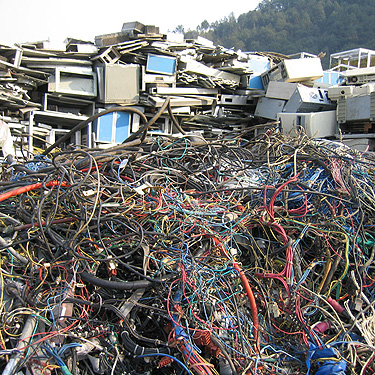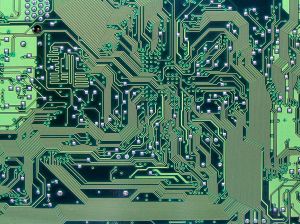Every
day I return home for lunch around 1 PM, when I always see a junk
collector's handcart parked on the street corner, along with the
owner standing nearby. Surprisingly, I have never seen usual junk
like empty bottles, tin cans, paper boxes and broken bathroom
fittings on his cart. On the contrary, his cart is always parked with
old Personal Computers, old CRT monitors, broken printers and all
that kind of discarded electronic or e-junk. I have been always
wondering, where from he manages get every day so many computers and
printers? Finally, I decided to ask him directly and satisfy my
curiosity. Few days back, I stopped my car near his cart and inquired
with him, about the junk he had collected on his cart that day. The
answers , which he gave me were quite revealing. All the electronic
junk like computers, printers and old telephones, which he had on his
cart, was collected by him on the same day. I naturally asked him
about what exactly he does with the junk. He told me that there is a
shop in the city, which buys only electronic junk on weight basis
from junk collectors like him, so he goes to the shop at the end of
the day and sells the collected junk to the shop.

I am
acquainted with a scrap dealer, whom I used to sell my factory scrap
earlier. By chance, I met him couple of days ago. I casually asked
him about the electronic junk. According to him, the computer junk
collected from the hard cart junk collectors is actually sold to big
scrap dealers in Delhi, who buy this e-junk on per ton basis from
shops spread all over the country. By now I was very curious about
this electronic junk trade. I decided to do some research on the net.
What I found was interesting but not very palatable.
Let us
trace out the entire journey of the e-junk from the household to
final destination. In the first place, what my street corner cart
owner had told me was half truth. The scrap dealer, who purchases
e-junk from him does not buy broken plastic parts or moulded plastic
cabinets. So my street corner cart owner, simply burns off the
plastic parts at the end of the day. Many of these plastic parts are
quoted with metal films and most of theme are sprayed with chemicals
containing Cadmium, lead, Mercury compounds and Bromides to make them
anti-inflammable. The fumes created by open burning of such parts,
are highly dangerous to the people in the vicinity and are also
carcinogenic with continuous exposure. Our hand cart owner does not
even know that he is playing with his own life by burning the plastic
parts in open.

The
bulk purchased electronic junk is usually sent to Delhi by trucks or
railway wagons. Here, this junk is first sorted out. The computers
which are salvageable or are in working order are separated and sent
to some cities in India's Rajasthan state like Bharatpur, Dholapur,
Bikaner, where these are repaired or cannibalized. Such cannibalized
computers then are sold to traders from smaller towns or schools for
as low a price as 30 to 40% of the price of a similar new computer.
Whatever remains after this cannibalization and is beyond use, is
again simply sent back to Delhi scrap traders. I have been always
under impression so far that these non salvageable computers along
with broken junk are used as a landfill and are simply dumped into
pits, dug into earth and covered up finally with loose soil. The
realities however quite differ from this and what happens later with
the junk is extremely polluting and unhygienic.

The
trade in old Personal Computers and other e-junk, taking place in
India's capital Delhi, has now reached such gigantic proportions
that Delhi along with being called India's capital, may be also
called as Capital of scrapped computers and e junk. As per present
figures, every year, Delhi recycles more than 20000 tons of e-junk
and it is likely that this figure could be much higher in coming few
years. Besides re-cycling the e-junk collected from throughout the
country, such electronic junk is now reaching Delhi from almost all
advanced nations of the world, who do not want to do anything with
the junk but simply discard it. A Ton of e-scrap is sold in Delhi
market for about 20000 Rupees (US$ 365.00) From this e-junk it is
possible to recycle or salvage around 10 Grams of Gold and 30 to 40
Kg of Copper and other metals worth 40000 Rupees.(US$ 730.00)
From
above mentioned figures, it may appear that this is a very lucrative
business. But this recycling is being done in Delhi in such hazardous
and deadlier way that anyone would come to the conclusion that this
cure for disposal of e junk is worse that the problem of creation of
the junk itself.
This
recycling work goes on in small villages surrounding Delhi. You can
watch 10 to 12 year old kids shaking trays filled with electronic
printed circuit boards in acid filled drums that come to almost their
height. They were rubber hand gloves but are not provided with any
mask or googles. Small droplets of acid can drop on these children
any time. Similarly the entire air surrounding these sheds is
saturated with acid fumes. All the kids working here suffer from
cough and breathing problems. Under such conditions, when the work is
over, these kids find solace in drinking hard illicit liquor.

The
residue that collects in the acid drums is collected each day. This
residue contains all the metallic salts. The metals like copper are
later recovered from the residue. Other e-junk containing glass an
plastic are similarly recycled in other small sheds with furnaces.
The working conditions here also are equally horrible. Within Delhi
metropolitan area the rules are very strict about child labour and
working conditions. Hence this entire recycling work is done in sheds
set up in small villages on periphery of Delhi. Since the
profitability of this business is more than 100%, it continues to
grow and flourish without bothering about the environment and health
of child labour utilized.
With
the popularity and the fact that manufacturers continuously keep
bringing newer and newer models out, the mobile phones are latest
additions to e-junk. Because of this, old scrapped mobile phones are
being brought to Delhi for recycling. No one seems to be bothered
that by bringing in this poisonous junk from everywhere in world to
Delhi and recycling it, we are causing a great harm to the
environment and immeasurable damage to the health and well being of
these poor children, who are forced to work in these recycling sheds.
21
September 2012
No comments:
Post a Comment